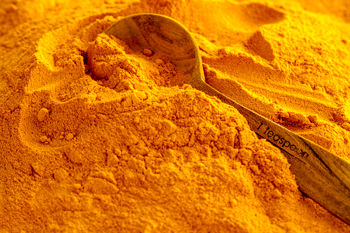The golden wonder spice
Author: Maharishi Ayurveda Date Posted:22 August 2016

It was with wonder as a child that I looked upon the yellow rice dish that mother used to prepare on special occasions. How did she make the usual white rice become yellow?
It was many years before I realised that the delightful yellow colour had come from the combination of turmeric (Latin name Curcuma Longa) and cooked rice. And even later still before I learnt the amazing benefits of this culinary spice used for thousands of years within the Ayurvedic tradition.
About Tumeric
Tumeric comes from the same family as ginger - Zingiberaceae - and is also known as Haridra or Haldi. It is called Jiang Huang in Chinese medicine.
Use of Tumeric dates back to 3000 B.C. It was in the 13th century that traders from Arabia introduced what they called 'Indian saffron' to the western world as a food flavouring along with its uses in Ayurvedic medicine.
Traditional medicinal use of turmeric
Few herbals possess the wide spectrum of qualities and medicinal uses as turmeric. Herbal medicine traditions from the east and west have traditionally used turmeric
as a powerful anti-inflammatory, the effects of which research now shows is comparable to pharmaceutical medicines
- for it's ability to alter the effects of an illness by purifying blood, increasing appetite, improving digestion and eliminating toxins.
- as an analgesic for support with pain
- to be active against bacteria
- to help with tumours
- to help with allergic conditions
- as a powerful anti-oxidant
- as an antiseptic on skin to help prevent the growth of micro-organisms
- as an antispasmodic - to help prevent or relieve spasms
- for it's astringent effects
- to help expel gas from the stomach or intestines in order to help relieve flatulence or abdominal pain, or distension
- to increase the flow of bile
- to aid digestion of food
- to increase the excretion of urine
- to support energy and activity
- to support the healing of wounds
When to use
Along with traditional use as summarised above, here is a summary of modern research indications for when to use Tumeric. Modern research is beginning to understand the amazing healing powers of Tumeric and have particularly focused research on the curcuminoids found within Tumeric. Here's what research so far suggests Tumeric may be helpful for:
- inflammatory conditions
- autoimmune conditions including osteoarthritis, uvetiis, ulcerative colitis
- insulin resistance and pre-diabetic conditions
- Diabetic microangiopathy and retinopathy
- conditions requiring antioxidant support
- irritable bowel syndrome, gastrointestinal symptoms and reflux
- possibly for oral lichen planus (results may be dependent on dose)
- Pre-cancerous conditions, adjunctive therapy for cancer, dermatitis caused by radiotherapy
- Supportive therapy for preventing cancer recurrence (although best to not take turmeric within 48 hours either side of chemotherapy or radiotherapy)
- Supportive therapy for cardiovascular disease
Interestingly, research shows that uptake is best supported when turmeric is taken in combinations with other herbals, just as Ayurveda recommends this to support uptake. Additionally, effectiveness of uptake is supported when turmeric is taken along with lipids or fats, like when it is lightly fried with ghee or olive oil during cooking.
How to take turmeric
1. For all-round support take 1-2 capsules of Tumeric Organic after breakfast and evening meals.
2. Use in your cooking. Turmeric is a key ingredient in our churnas (organic spice mixes)
3. Take sips of a tea every 15-30 minutes through the day
4. JOINT HEALTH Select one of the following products
5. REPRODUCTIVE HEALTH Select one of the following products
6. DIGESTIVE AND SKIN HEALTH Select one of the following products
7. RESPIRATORY HEALTH Select one of the following products
8. ANTI-OXIDANT SUPPORT Take 1-2 tablets of Amrit Kalash Nectar 30 minutes prior breakfast and evening meals.
Wishing you the bliss of balance.
|
Linda Sinden has been a practising Maharishi Ayurveda Consultant since 1990 and is a regular contributor to our weekly Insights. She has a practice in Auckland, New Zealand and also provides phone or Skype sessions for those who need assistance, but don’t have a consultant in their vicinity. Email: lindasinden@orbislife.co.nz Skype: Linda.Sinden |
.jpg) |


